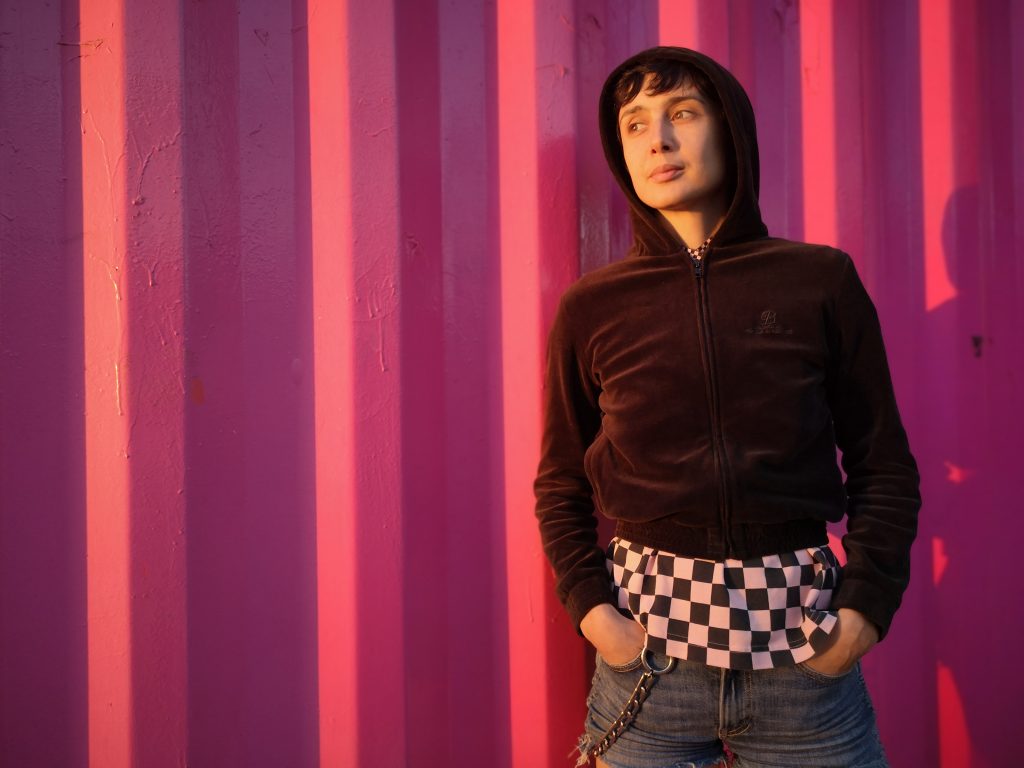About
Nikima Jagudajev (1990) is a Brussels based artist and choreographer. Their performance-based work is a collaborative act of building worlds in which unexpected encounters happen through various, often game-like structures.
Jagudajev works with and assembles material that becomes contra-normative infrastructure. At play are dance phrases that fold in on themselves infinitely, snacking and napping, as well as game objects such as a deck of cards and a huge jigsaw puzzle. An expansive deployment of the practice of alteration by sewing machine and cross-stitch, from the production of artworks to the modification of visitor’s clothing, alters the space. In the realms of film, documentary, video game, and performance, archetypes and avatars, be they cosmic characters or 3D renderings, traverse portals and thresholds both digital and choreographic. Doodles and doom metal appear in unconventional proportions and distortions, and contribute to the mythopoetic lore forever getting re-constructed.
Re-schooling, or how play, as an ordered activity that has its end within itself, subverts the institution, is the core concept of Jagudejev’s artistic practice. Their works are made for the performer and visitor to find fulfillment, in the sense of playing and sharing an experience of deviance. Social relations are conceived as spatial relations; spaces are transformed through social interaction.
Always durational, the disruptive and unfamiliar nature of these large-scale long-form megaworks ask for the interactions that take place to be similarly unfamiliar. Performers and visitors hang out, in one way or another, within the strange and unexpected nature of these constructed worlds. As people come and go, the space changes configurations, keeping the interactions from calcifying into socio-political norms, rendering the world specific, disorienting, and queer.
Jagudajev’s work is represented in the collection of mumok – Museum moderner Kunst Stiftung Ludwig Wien in Vienna. Solo exhibitions of their work have been shown at Westfälischer Kunstverein, Münster (2025), mumok (2024), Accelerator, Stockholm (2024), WIELS, Brussels (2023), Shedhalle, Zürich (2022), and Bergen Kunsthall, Norway (2021). Other shows were held at Scuola Piccola Zattere, Venice (2025), Kiasma Theater, Helsinki (2025), Kurimanzutto, Mexico City (2020), Centre d’Art Contemporain Genève (2019), MoMA PS1, New York (2018), Human Resources LA (2018), The Whitney Museum of American Art, New York (2017), and the Rockbund Art Museum, Shanghai (2017), as well as in the context of Beyond the Black Box at De Brakke Grond, Amsterdam (2024), KAAP’s Dansand! Festival, Ostend (2023), Material Art Fair’s Immaterial, Mexico City (2020), 89+ at LUMA/Westbau, Zürich (2017), and as part of the Marrakech Biennale, Morocco (2015).
Published work by Jagudajev includes « The Backstreet Boys » as part of Bergen Kunsthall’s Speculative Histories text commission platform (2021) and co-published by Karmaklubb*, « Relations of Unpredictable Encounters » in the Movement Research Performance Journal (2017) and « the landscape thinks itself in me » in Asad Raza’s Root Sequence. Mother Tongue (Walther König, 2018).
Jagudajev studied at LEWIS & CLARK COLLEGE and received a BA in Anthropology/Sociology with an Honors in dance and a focus on Ghanaian dance (2008-12).
